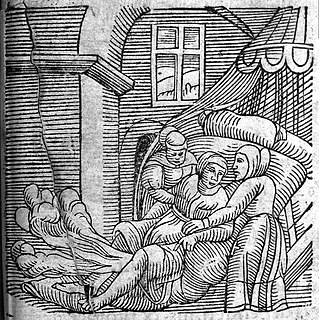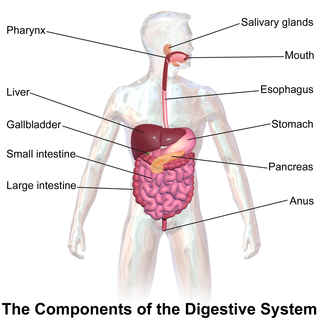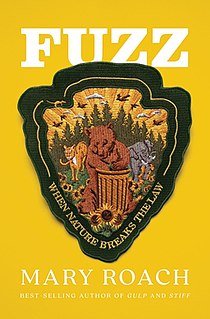
Flatulence is defined in the medical literature as "flatus expelled through the anus" or the "quality or state of being flatulent", which is defined in turn as "marked by or affected with gases generated in the intestine or stomach; likely to cause digestive flatulence". The root of these words is from the Latin flatus – "a blowing, a breaking wind". Flatus is also the medical word for gas generated in the stomach or bowels. Despite these standard definitions, a proportion of intestinal gas may be swallowed environmental air, and hence flatus is not totally generated in the stomach or bowels. The scientific study of this area of medicine is termed flatology.

Digestion is the breakdown of large insoluble food molecules into small water-soluble food molecules so that they can be absorbed into the watery blood plasma. In certain organisms, these smaller substances are absorbed through the small intestine into the blood stream. Digestion is a form of catabolism that is often divided into two processes based on how food is broken down: mechanical and chemical digestion. The term mechanical digestion refers to the physical breakdown of large pieces of food into smaller pieces which can subsequently be accessed by digestive enzymes. Mechanical digestion takes place in mouth through mastication and in small intestine through segmentation contractions. In chemical digestion, enzymes break down food into the small molecules the body can use.
Appetite is the desire to eat food items, usually due to hunger. Appealing foods can stimulate appetite even when hunger is absent, although appetite can be greatly reduced by satiety. Appetite exists in all higher life-forms, and serves to regulate adequate energy intake to maintain metabolic needs. It is regulated by a close interplay between the digestive tract, adipose tissue and the brain. Appetite has a relationship with every individual's behavior. Appetitive behaviour also known as approach behaviour, and consummatory behaviour, are the only processes that involve energy intake, whereas all other behaviours affect the release of energy. When stressed, appetite levels may increase and result in an increase of food intake. Decreased desire to eat is termed anorexia, while polyphagia is increased eating. Dysregulation of appetite contributes to anorexia nervosa, bulimia nervosa, cachexia, overeating, and binge eating disorder.

Enterocytes, or intestinal absorptive cells, are simple columnar epithelial cells which line the inner surface of the small and large intestines. A glycocalyx surface coat contains digestive enzymes. Microvilli on the apical surface increase its surface area. This facilitates transport of numerous small molecules into the enterocyte from the intestinal lumen. These include broken down proteins, fats, and sugars, as well as water, electrolytes, vitamins, and bile salts. Enterocytes also have an endocrine role, secreting hormones such as leptin.

A crop is a thin-walled expanded portion of the alimentary tract used for the storage of food prior to digestion. This anatomical structure is found in a wide variety of animals. It has been found in birds, and in invertebrate animals including gastropods, earthworms, leeches, and insects.
Teacher's Pet is a 1930 two-reel comedy short, part of the Our Gang series. It was produced by Hal Roach, directed by Robert F. McGowan, and originally released to theatres by Metro-Goldwyn-Mayer on October 11, 1930. It was the 101st Our Gang short to be released.

Gastrointestinal perforation, also known as ruptured bowel, is a hole in the wall of part of the gastrointestinal tract. The gastrointestinal tract includes the esophagus, stomach, small intestine, and large intestine. Symptoms include severe abdominal pain and tenderness. When the hole is in the stomach or early part of the small intestine, the onset of pain is typically sudden while with a hole in the large intestine onset may be more gradual. The pain is usually constant in nature. Sepsis, with an increased heart rate, increased breathing rate, fever, and confusion may occur.
Aerophagia is a condition of excessive air swallowing, which goes to the stomach instead of the lungs. Aerophagia may also refer to an unusual condition where the primary symptom is excessive flatus (farting), belching (burping) is not present, and the actual mechanism by which air enters the gut is obscure or unknown. Aerophagia in psychiatry is sometimes attributed to nervousness or anxiety.

Horace Fletcher was an American food faddist who earned the nickname "The Great Masticator" for his argument that food should be chewed thoroughly until liquefied before swallowing: "Nature will castigate those who don't masticate." He made elaborate justifications for this claim.

Stiff: The Curious Lives of Human Cadavers is a 2003 nonfiction book by Mary Roach. Published by W. W. Norton & Company, it details the unique scientific contributions of the deceased.

Mary Roach is an American author specializing in popular science and humor. She has published six New York Times bestsellers: Stiff: The Curious Lives of Human Cadavers (2003), Spook: Science Tackles the Afterlife (2005), Bonk: The Curious Coupling of Science and Sex (2008), Packing for Mars: The Curious Science of Life in the Void (2010), Gulp: Adventures on the Alimentary Canal (2013), and Grunt: The Curious Science of Humans at War (2016).

Marcus L. Rowland is an English retired laboratory technician and a notable author in the field of role-playing games, particularly games with Victorian era content.
Austin Powers is a series of American spy action comedy films: Austin Powers: International Man of Mystery (1997), Austin Powers: The Spy Who Shagged Me (1999) and Austin Powers in Goldmember (2002). The films were produced and written by Mike Myers, who also starred as the title character and Dr. Evil. They were directed by Jay Roach and distributed by New Line Cinema.

Spook: Science Tackles the Afterlife (2005), published by W. W. Norton & Company, a nonfiction work by Mary Roach, is a humorous scientific exploration as to whether there is a soul that survives death. In Britain, the title of the book is Six Feet Over: Adventures in the Afterlife.

Tom Vanderbilt is an American journalist, blogger, and author of the best-selling book, Traffic: Why We Drive the Way We Do . His traffic book was published on November 13 2009, made in various parts of the world: some like Barcelona Spain, Mexico City, New York United States, Tokyo Japan, etc.
A gulp refers to the act of swallowing.

Bonk: The Curious Coupling of Science and Sex is a 2008 book by Mary Roach. It follows the winding history of science and its exploration of human sexuality, going back as far as Aristotle and finally ending with recent discoveries about the origination and anatomy of the female orgasm. Throughout, Mary Roach provides a humorous and often very personal view—both as a participant and observer—of humans, scientists, animals, and sex machines. Of the book's numerous accounts, Roach discusses artificial insemination of sows in Denmark, the history of sex machines, and provides commentary on Alfred Kinsey's notorious attic sex experiments. Her footnotes provide additional humor: as in a sentence that includes several DSM diagnoses listed as acronyms, she adds, "And from HAFD ". In the book, Roach describes a session in which she and Ed, her husband, volunteer to have sex while being recorded by a groundbreaking 4D ultrasound, in the interests of science. A doctor looks on during the experiment, making suggestions, and finally telling Ed that he "may ejaculate now".

The human digestive system consists of the gastrointestinal tract plus the accessory organs of digestion. Digestion involves the breakdown of food into smaller and smaller components, until they can be absorbed and assimilated into the body. The process of digestion has three stages: the cephalic phase, the gastric phase, and the intestinal phase.

Grunt: The Curious Science of Humans at War is a nonfiction work by Mary Roach, published in June 2016 by W. W. Norton & Company. The book covers the subject of scientific research for the military and some of the less well-known aspects of the lives of soldiers. Instead of focusing on the science that can kill, Roach looks at the science of saving lives and improving the quality of a soldier's experience. In this book, Roach attempts to answer many questions about the military that the reader may not have thought of before and discusses the challenges that soldiers have to face on the battlefield that do not necessarily directly involve fighting. It has been described as "both entertaining and informative in the best tradition of science writing".

Fuzz: When Nature Breaks the Law is a 2021 nonfiction book by Mary Roach. Published by W. W. Norton & Company, it details the "curious science of human-wildlife conflict."















